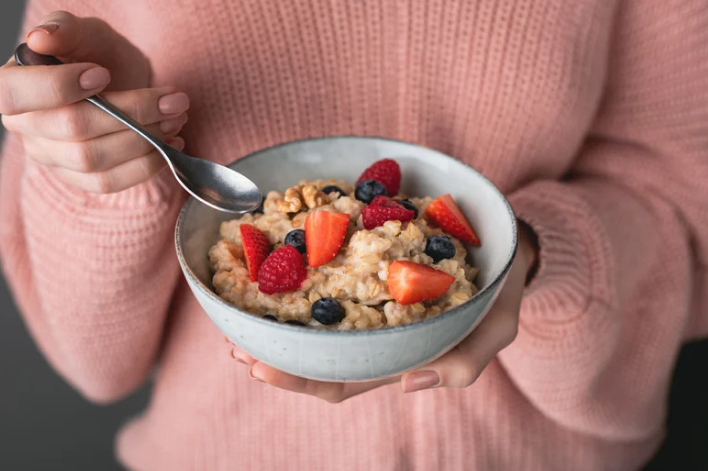Protein supplements are popular among casual exercisers, serious bodybuilders, dieters and even non-exercisers for many reasons. Most people know that protein is an essential nutrient for overall health that helps promote fullness and also plays a role in muscle recovery and repair. Research has also shown that proper nutrition, including protein, is beneficial to athletic performance. Protein carries a connotation of being healthy, so many assume that drinking protein shakes or using protein supplements is a good step toward better health and fitness. But is this perception of health a fact or a fallacy?
Should You Use Supplements as a Shortcut to Protein?
Protein-rich foods (think dairy products, meats, beans and eggs) often require cooking, need to be refrigerated for safety and don't always transport well as on-the-go snacks or mini meals. In contrast, supplements make it easy! They're shelf-stable, easy to transport, great-tasting (if you can find one you like) and often need nothing more than water to mix up. And as drinks, they're easy to consume anywhere.
However, regardless of your fitness, health or nutrition goals, protein supplements are far from required eating. When considering a protein supplement, it's worth noting that:
- There are many foods packed with protein that you can creatively fit into your meals and snacks to meet your needs without relying on a supplement.
- Real, whole foods—as opposed to protein powders, which are highly processed—are more natural to include in the human diet, so many people aiming for a more organic diet might not find supplements as appealing.
- Unprocessed, protein-rich foods also contain other vital nutrients needed by the body in their natural states, such as iron, zinc, calcium and vitamin B.
- The protein-rich foods you can buy at the store (meat, milk, eggs, soy products and more) are cheaper than almost any protein supplement.
- Foods—as opposed to supplements and protein drinks—are regulated for safety. Some Consumer Reports testing found that many of the most popular protein supplements were contaminated with heavy metals like lead, mercury and more. That, coupled with the lack of regulations surrounding supplements, means you are putting a lot of trust into the company making the product you're ingesting.
Despite all of these factors, many people simply enjoy protein shakes. They often taste great, they add extra nutrients and filling power to many dishes (like fruit smoothies), and they can be used in creative ways to boost daily protein intake. While consuming protein supplements is seldom necessary to meet your protein needs, they can provide a nice protein boost to your meal or snack. But remember: If you're already eating enough protein, consuming extra is just an additional source of calories, so plan wisely!
With so many different types of protein powders out there, how do you pick one that's right for you? Let's explore the main options (from dairy to soy to peas) so you can make an informed choice.
Animal-Based Protein Supplements
Dairy-Based Protein Supplements
These use cow’s milk as the protein source, but you won't typically see milk listed as the main ingredient. Rather, specific protein-rich components of milk (like whey, casein or sometimes a combination of both) are extracted from cow's milk during processing and used as the main ingredients. Both whey and casein are considered high-quality protein sources; their amino acid profile meets the needs of humans, is generally easy to digest (for those who have no lactose allergy or sensitivity) and easily utilized by the body. And like milk, these protein supplements contain all the essential amino acids needed by the human body and are considered a complete protein.
There are two types of dairy (milk)-based protein supplements:
1. Whey protein is the most common protein powder, and also the most researched. It is manufactured by drying pasteurized whey—the liquid byproduct of cheese-making. It has been shown to be easily digested and absorbed, and is effective in building and maintaining muscle mass. However, studies have found that it doesn't necessarily improve the physical effects of exercise in middle-aged overweight and obese adults. You can get whey protein in an isolate or concentrate form, and the label should list which form is used. There is a difference between the two, both in protein quantity and usually in price.
Whey protein isolate (WPI) contains a higher concentration of protein: 90 percent protein or 24 grams per ounce. This form is more easily absorbed than the concentrate form. It also tends to cost more.
Whey protein concentrate (WPC) will vary in its protein content, containing as little as 20 percent and up to 89 percent protein. Read the nutrition facts label to see how much protein a particular supplement like this really contains per ounce. If possible, select "WPC 80 percent," which is more highly concentrated.
2. Casein protein is manufactured by heating milk. The milk forms clumps (curds) and the liquid whey is removed. The water is then removed from the remaining clumps, which are processed into the appropriate particle size. Casein protein typically comes in isolate form, which, like whey protein isolate, is a high concentration of protein, at about 22 grams per ounce. Although easily utilized by the body, it does take longer to digest than whey protein, resulting in a more sustained amino acid release.
A blend of whey and casein protein is also available in supplement form. Some people purchase both supplements separately and blend them together, in the theory that they'll achieve better long-term muscle recovery by getting both fast-acting whey and slower-acting casein in a single supplement. While a professional or collegiate athlete might benefit from such a tactic, the average adult probably wouldn't see a major benefit.
People with milk or lactose allergies or sensitivities should avoid whey and casein protein supplements, although some low- and no-lactose options are available.
Egg-Based Protein Supplements
Egg protein powder is made from egg whites (albumin), and therefore contains no fat or cholesterol. While this supplement is nutritionally the same as pasteurized powdered egg whites, the particle size might be altered and additives used for a better shake consistency when the powder is mixed with water. It contains about 21 grams of protein per ounce and is easily absorbed (eggs rank equal with soy, whey and casein as the highest quality protein sources), and is also a complete protein source that contains all essential amino acids.
Egg-based protein supplements would not be appropriate for people with egg allergies or those who choose to avoid egg (such as vegans).
Plant-Based Protein Supplements
Soy-Based Protein Supplements
Surprisingly, the body can absorb and utilize soy protein powder at about an equal rate to that of whey or casein. That's why, as an alternative to dairy, soy protein can be a great choice for many people. The protein in these soy-based powders is derived from soy flour, which is made of finely ground soybeans. Rather than seeing soy flour on the label as one of the main ingredients, however, you'll see soy protein isolate or soy protein concentrate. (Only the protein-rich portion of soy flour is extracted and used to make the supplement.)
Like whey supplements, soy powders are also available in isolate and concentrate form; isolate is a higher concentration of protein, with most of the soy fat and carbohydrates removed. It has about 15 grams of protein per ounce and is more expensive than soy concentrate. The concentrate form can vary greatly in its protein content per ounce (and is therefore cheaper). Read the label closely to determine the protein content.
Compared to whey, soy protein is a bit lower in protein, but it is a high-quality complete protein source, and can be an affordable option. This supplement would not be appropriate for someone with a soy allergy or anyone who chooses to avoid soy for personal or medical reasons. Research has shown that supplementing with soy protein-rich foods won't necessarily aid in weight loss.
Other Plant-Based Protein Sources
More and more plant-based protein powders are becoming available, fulfilling the needs of people who have to (or choose to) avoid dairy, eggs and soy. Because they are plant-based, they do not include all of the essential amino acids and are considered lower quality and incomplete proteins. Many brands add synthetic (non-animal-derived) forms of the missing amino acids to make their protein powders complete, but not every brand meets that criteria. Compared to the supplements discussed above, powders made from rice (or brown rice) protein, pea protein or hemp protein tend to be the most expensive.
The most common plant-based powders you might find include:
- Rice protein, made from the protein component in brown rice, which contains 18 grams of protein per ounce.
- Pea protein, which isolates the protein found in the legume and contains about 20 grams of protein per ounce.
- Hemp protein, which is made from hemp flour (ground hemp seeds). It contains 12 grams per ounce and is often touted as also being a source of healthy fats and fiber.
For individuals who already eat a varied diet that includes other protein-rich foods, these incomplete protein powders could be used safely. For those following a strict vegan diet, remember to include a greater variety of other plant-based protein foods to ensure that you're getting all essential amino acids.
Quick Comparison of Protein Contents
This is a general chart. Always read a product's nutrition facts label to determine the exact amount of protein contained in a single serving.
| Type of Protein | Protein Content per Ounce |
| Whey Protein Isolate (WPI) | 24 g |
| Whey Protein Concentrate (WPC) | Can vary greatly, so read the label—look for a product with 80 percent WPC |
| Casein Protein Isolate | 22 g |
| Egg Protein | 21 g |
| Pea Protein | 20 g |
| Rice Protein | 18 g |
| Soy Protein Isolate | 15 g |
| Soy Protein Concentrate (SPC) | Can vary greatly, so read the label—look for a product with 70 percent SPC |
| Hemp Protein | 12 g |
What All Protein Powders Have in Common
Once you choose the type of protein you want to use, there are a few more things to consider. Only in rare cases will you find totally pure protein powders with no other ingredients added. More often than not, you'll see a variety of added supplements, sweeteners, flavorings and additives listed in the ingredients. So beyond choosing the base (dairy, soy, egg or plant), you'll have to read and compare labels to find out what else you are ingesting when choosing a particular supplement. Here are some things to look for.
-
Sweeteners. Most protein powders are bland, plain or naturally have a sour taste unless combined with sweeteners. You'll often see a variety of sweeteners used in these supplements. Some might use real (caloric) sweeteners, such as sugar or fructose. But most often you'll encounter artificial sweeteners or sugar alcohols, which are considered non-caloric sweeteners. "No sugar added" or "sugar-free" claims on the labels usually mean the powder contains artificial sweeteners.
-
Flavorings. These days, you can find just about any flavor of protein powder, from cake batter to red velvet to blueberry muffin—as well as the traditional vanilla, chocolate and unflavored versions. Check the ingredients listed to determine where this flavor comes from. The more interesting the flavor, the more likely that you'll find artificial ingredients and food colorings. When you do choose a plain, unsweetened variety, however, you'll have many more options (beyond shakes) for using those protein powders.
-
Additives. For that rich, creamy shake consistency, additives are a must. Soy lecithin is used to help prevent lumping and clumping when water is added to the protein powder. Ingredients such as xanthan gum, cellulose gum, sodium alginate and carrageenan (also gums) can be added to assure that the shake is creamy, smooth, thick and viscous. These also give more volume to the shake.
-
Additional vitamins, mnerals or supplemental ingredients. Many protein powders come with other additives, such as vitamins, minerals, herbs, creatine, growth peptides and glutamine. While it might seem like you are getting more bang for your buck out of these enhanced protein supplements, be wary. It is easy to overdose on certain nutrients when taking supplements. Additionally, many additives are not regulated by the Food and Drug Administration, and have not been tested for safety or effectiveness. Additionally, don't believe the claims that a protein powder can produce rapid weight loss, increased muscle mass or other miraculous results. Although it is true that protein aids in satiety and muscle-building, it is not the end-all answer to weight loss or muscle recovery. You can only build muscle by exercising properly and eating properly (and that goes way beyond protein intake alone), and no single food (or shake) will result in weight loss.
Concerns and Tips for Using Protein Powders
In an ideal world, we'd get all of our nutrients from wholesome, natural and unadulterated foods. But in the modern world, that can be difficult and, in some people's eyes, boring. Protein powders can fill a need and satisfy a craving—but be careful not to allow them to make up the bulk of your diet. As much as possible, try to meet your protein needs with food. And remember: All things in moderation. For optimal health, aim for a diet that's rich in variety—and the more unprocessed, the better!
Here are some additional tips and concerns relevant to using protein powders.
-
Safety and effectiveness: In the United States, protein supplements are not regulated by the Food and Drug Administration and are not tested for safety and effectiveness. Be wary of any claims made by a supplement. Look for third-party verification (research studies, independent testing groups or seals, etc.) that the supplement contains the nutrients and ingredients as listed (and in the amounts indicated).
-
Purity: In 2010, Consumer Reports found several protein supplements to be contaminated with heavy metals—arsenic, cadmium, lead and mercury. Any processed food could have hidden contaminants, but because supplements are not regulated or tested for purity, the risk is on the consumer. These were attributed to the manufacturing process, but were present in alarming amounts for some brands.
-
Excess consumption: Consuming too much protein powder can bring about nausea, thirst, bloating, cramps, headache and dehydration. (Any nutrient eaten in excess can have negative health effects.) However, when used in moderation to supplement the protein you already consume from a diet of real, whole foods, the occasional serving of protein powder is perfectly fine.
-
Creative ideas: While a plain protein powder can be used to make a sweet-tasting shake or smoothie, it can also be added to savory dishes such as dips, soups, casseroles, meatloaf, pudding, yogurt, oatmeal, mashed potatoes, muffins and quick breads. You can find countless protein powder recipes online, so don't be afraid to dabble in creative ways to boost the protein content of your usual recipes.
-
Be skeptical: You might have heard personal trainers or other fitness professionals say that consuming more protein will produce better results, both in fitness levels and aesthetic appearance. However, well-meaning personal trainers often overestimate protein needs by using calculations established for professional athletes instead of using calculations for average exercisers.
Additionally, it's worth noting that some seemingly credible trainers and nutrition professionals earn additional income by selling protein supplements. It is often in their financial interest to tell you that you need more protein, or a specific supplement that they happen to sell. This is an unethical practice and a conflict of interest. Do your own research to determine whether you really need more protein, or contact a registered dietitian to help you pinpoint your protein needs. Supplement choices should be based on scientific evidence and research, not necessarily what is endorsed by someone else.
This article was written using scientific guidelines for the overweight, yet medically healthy adult. Please contact your doctor or registered dietitian to determine protein needs and type of protein supplement to use for any medical condition, such as kidney (renal) disease, Crohn’s disease, ulcerative colitis, the healing of burns, pressure ulcers, wounds, sepsis and infections, AIDS, trauma and surgical wounds.













